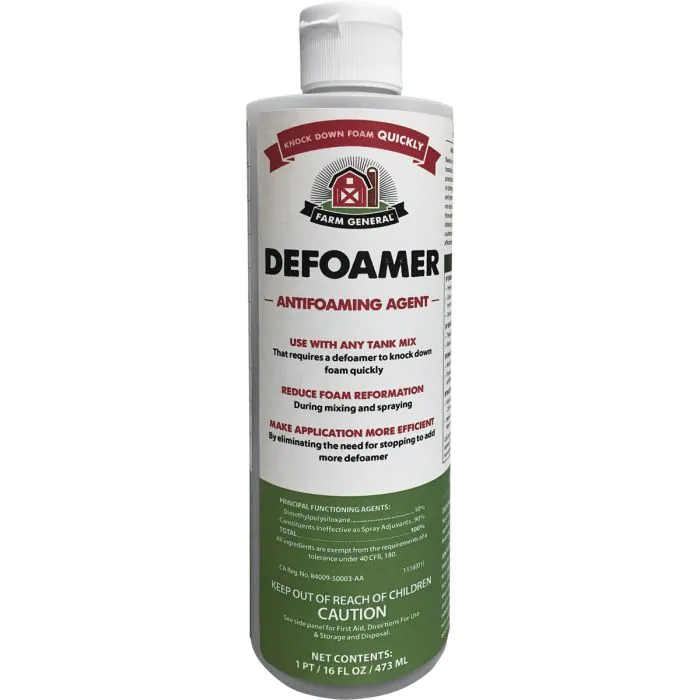The Role of Chemical Defoamer in Water Treatment Management
The Role of Chemical Defoamer in Water Treatment Management
Blog Article
Discover the Leading Factors You Need a Chemical Defoamer for Effective Foam Control
Chemical defoamers offer as necessary representatives that alleviate foam formation, thus enhancing procedures in fields such as food production, drugs, and wastewater treatment. As we explore the complex advantages of chemical defoamers, it becomes noticeable that their role expands past simple foam reduction, impacting overall productivity in ways that may not be immediately apparent.
Enhanced Functional Performance
The presence of foam can impede manufacturing by obstructing tools, decreasing capability, and complicating process control. By minimizing surface area stress, they promote the rapid collapse of foam, permitting for smoother operation and minimizing downtime.
In sectors such as food and drink, pharmaceuticals, and wastewater therapy, the application of defoamers enhances procedure security and item quality. For example, in fermentation processes, managing foam generation is important for optimizing yield and effectiveness. Furthermore, the usage of defoamers can result in more efficient blending and oygenation, causing enhanced response times and general productivity.
Moreover, when foam is successfully managed, it decreases the risk of overflow and contamination, making certain compliance with safety and top quality requirements. Inevitably, the combination of chemical defoamers right into industrial procedures fosters a more effective workflow, enhancing outcome while preserving premium standards.
Price Savings and Source Monitoring

In addition, making use of defoamers improves the performance of raw product use. In several applications, too much foam can cause overuse of chemicals, leading to unneeded expenditures. By regulating foam levels, organizations can maximize their chemical input, consequently decreasing functional prices. This not just contributes to economic savings yet also advertises sustainable practices by minimizing waste.
Additionally, minimized foam in processing systems can enhance the overall throughput, permitting centers to raise production ability without incurring added prices - Chemical Defoamer. This efficient resource administration equates into considerable economic advantages, making it possible for companies to allot funds towards advancement or expansion. In summary, the assimilation of chemical defoamers right into industrial processes cultivates a much more resource-efficient and cost-efficient environment, eventually sustaining business development and sustainability
Improved Item Quality

Using chemical defoamers plays a vital function in improving product top quality throughout different sectors. Extreme foam can cause inconsistent product solutions, influencing the last attributes of products such as paints, layers, food, and drugs. By reducing foam formation, chemical defoamers facilitate smoother manufacturing procedures, making certain that formulations remain uniform and satisfy specified quality criteria.
In the food and beverage sector, for example, the existence of foam can influence the clarity and taste of items, inevitably affecting consumer complete satisfaction. Chemical defoamers help keep the desired texture and look, therefore boosting the total quality of the end product. Similarly, in the manufacturing of coatings and paints, foam can result in issues such as pinholes and poor adhesion, undermining the item's performance.
Furthermore, the usage of defoamers can boost the efficiency of processes like fermentation and emulsification, which are crucial for achieving wanted product characteristics. By streamlining manufacturing and ensuring view regular top quality, chemical defoamers not just boost the end product yet additionally contribute to a favorable brand credibility. Hence, investing in efficient foam control remedies is essential for any type of service intending to provide high-grade products consistently.
Devices Protection and Durability
Lessening foam production is necessary for protecting tools and ensuring its longevity in different commercial applications. Excessive foam can cause a variety of operational problems, consisting of devices damage, enhanced upkeep costs, and unintended downtime. When foam gathers, it can cause overflow, causing spills that compromise the integrity of machinery and bordering locations.
Moreover, foam can obstruct sensing units and pumps, which can prevent efficiency and efficiency. In serious situations, it can lead to the break he said down of components, necessitating expensive repair work or substitutes. By using a chemical defoamer, companies can effectively mitigate foam formation, therefore safeguarding their tools from the detrimental results of foam-related concerns.
In enhancement to avoiding damage, effective foam control can dramatically improve the operational lifespan of equipment. Spending in a quality chemical defoamer is a positive approach for shielding equipment and cultivating longevity in industrial setups.
Flexibility Across Industries
Chemical defoamers play a vital function in numerous sectors, successfully resolving foam-related difficulties across diverse applications. Their versatility is evident in fields such as food and drink, drugs, and wastewater treatment, where foam can hinder processes and lower performance. In the food industry, defoamers make sure smooth manufacturing by stopping foam formation throughout blending, fermentation, and bottling, thereby maintaining product top quality and uniformity.

Moreover, in wastewater therapy centers, chemical defoamers are employed to regulate foam throughout the oygenation process, promoting optimal microbial activity and enhancing the overall treatment efficiency. Their ability to work efficiently in high-temperature and high-shear atmospheres even more underscores their adaptability.
Verdict
In conclusion, the utilization of chemical defoamers is imperative for efficient foam control throughout different sectors. The versatility of defoamers permits for widespread application in food manufacturing, pharmaceuticals, and wastewater therapy, eventually adding to lasting development and the upkeep of high functional requirements (Chemical Defoamer).
Chemical defoamers serve as important agents that alleviate foam formation, therefore enhancing procedures in markets such as food production, drugs, and wastewater therapy. As we explore the diverse advantages of chemical defoamers, it comes to be noticeable that their role extends past plain foam reduction, affecting overall efficiency in means that may not be immediately evident.
By minimizing foam development, chemical defoamers assist in smoother production processes, making sure that formulas stay consistent and fulfill given high quality standards.
By utilizing a chemical defoamer, business can properly minimize foam development, hence guarding their devices from the damaging impacts of foam-related issues.
In verdict, the use of chemical defoamers is essential for efficient foam control across various markets.
Report this page